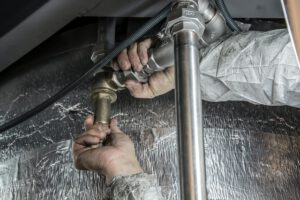Your residential plumbing system is a complex network that includes hot and cold water supply pipes, fixtures, appliances, drain pipes, vent pipes, water storage tanks, and other components. All of these components are placed inside or on walls to provide safe and reliable water supplies in the right quantity and pressure. They are also responsible for monitoring and detecting leaks, preventing foul gas entry into the home, and regulating water pressure. For this reason, you must understand the components of your plumbing system.

Residential Plumbers work closely with designers, mechanical engineers, and other specialists. In addition to residential plumbing, commercial plumbing companies work on industrial and commercial buildings that have different piping requirements than residential structures. While residential structures are often smaller in size, commercial buildings have larger rooms and ceilings. Because of these differences, the plumbing systems they install must be compatible with the space to ensure proper water supply and energy efficiency. Even if you have an existing residential plumbing system, it’s still a good idea to schedule an annual check-up. You’ll never know when a plumbing emergency may strike.
Commercial and residential plumbing is different in many ways. Commercial plumbing systems are designed to accommodate higher volumes of usage. They include pipes, drains, sinks, and washers. They also require more outlets and pipe fitting than residential systems. A high-grade commercial system is made to last for a longer time and reduce break-downs due to strain. Household plumbing systems, on the other hand, typically require only a few floors. They may use low-grade pipe fixtures to save money.
A residential plumber can perform a variety of services. The services of a residential plumber range from clogged drains to sewer stoppages and sewer pipes. Residential plumbers can also perform routine maintenance on residential plumbing systems, which ensures that the gas pipes are working properly and that the bathroom and kitchen systems are in top shape. A residential plumbing company can solve many of these problems, which makes it a valuable asset for homeowners. So if you’re looking for a residential plumber, make sure to choose one that has many services to offer.
Commercial and residential plumbing systems require different types of skills and tools. Commercial plumbers deal with more complex systems, such as water heating systems for entire buildings or burst water mains. A residential plumber specializes in the proper operation of single-family dwellings. They can repair a clogged kitchen drain, install a water-saving toilet, or repair a broken pipe. This type of plumber works directly with the property owners and the people who use the plumbing system.
In addition to the various types of repairs, residential plumbers must also maintain the integrity of the entire plumbing system. As a result, if one pipe breaks, a water heater could experience significant damage. In addition to clogging toilets, leaks can result in flooding and other complications in the building’s plumbing system. Whether it’s a leaky faucet or a faulty toilet, a professional residential plumber can identify the cause of the problem and quickly address the problem.
The plumbing systems of commercial buildings have different needs. Larger buildings typically have more occupants and require larger pipes and outlets. This leads to more frequent maintenance and repair needs. Commercial buildings also tend to use more water, which can lead to larger pipes and fixtures. They also have different code and permit requirements. For this reason, commercial and residential plumbing professionals work with different types of machines. And remember that commercial buildings are more demanding than single-family homes.
Your sewer system has several components, including vents, traps, and cleanouts. Generally, vents stick out from the roof of the house, which allows air to enter the drainpipes. Without this air supply, wastewater would back up in these pipes. Therefore, you need to install a drain-waste-vent system in your home if you have multiple stories. But if your drainage system is ineffective, you should contact a plumbing professional to install a new sewer line.
In addition to a water-supply system, your residential plumbing system includes pipes that carry water from fixtures to appliances. Because there are so many different pipe materials, it can be difficult to choose the right one for your project. Pipe material can affect your water supply, drainage, sewer, and exterior. In the past, galvanized steel and cast iron pipe were the primary choices. Nowadays, these pipes are made of different materials and can be costly.